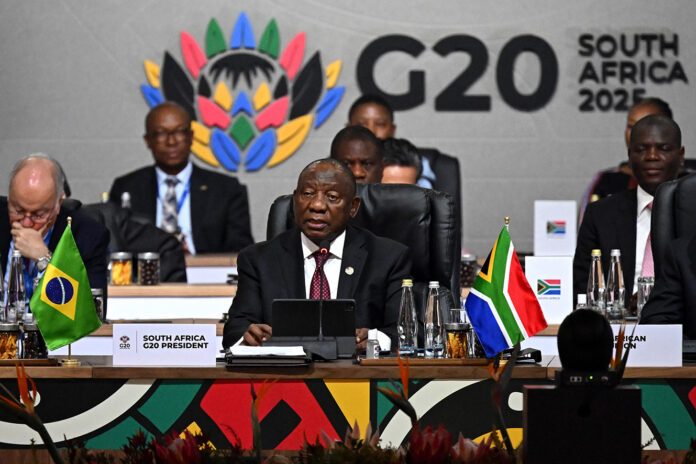At the G20, a ritual gathering of global powers, President Cyril Ramaphosa’s statements were not just policy positions; they were performances aimed at reshaping South Africa’s and Africa’s role within this community.
Here’s what his key phrases really meant:
1. On the “G20@20 Review“:
A ritual of institutional memory.
* What Ramaphosa said: He highlighted the importance of the G20@20 Review, a look back at two decades of the forum.
This was an act of reinforcing the G20’s own mythology and legitimacy. By participating in this ritual of reflection, Ramaphosa positioned South Africa not as an outsider but as a vested stakeholder in the group’s history. It’s a way of saying, “We belong to this club, its past is our past, and its future is our concern.” This builds social capital within the group.
2. On inequality as a “constant feature”:
Naming a shared, unresolved taboo.
- What Ramaphosa said: He framed poverty and inequality as a “constant feature” and a threat to global stability.
In a forum often dominated by financial metrics, this language reframes a systemic issue as a failure of the group’s shared moral economy. By calling it a “constant feature”, he subtly accuses the existing global system of being designed to perpetuate this state. It’s a challenge to the group’s collective conscience, moving the issue from an economic statistic to a shared social pathology.
3. On “crippling debt”:
A critique of the power ritual.
- What Ramaphosa said: He noted that “crippling debt” forces developing nations to divert resources from development.
-
The ethnographic why: This phrase exposes the hidden power dynamic in lender-debtor relationships. Ethnographically, debt is not just a number; it’s a form of social control that dictates a nation’s rituals of budgeting and prioritisation. By calling it “crippling”, he dramatises this relationship, portraying debtor nations as being in a state of ritual impurity, forced to make sacrifices that hinder their social development to appease external financial powers.
4. On a “renewed commitment to multilateral cooperation”:
Reinforcing a sacred norm.
- What Ramaphosa said: He stressed that shared goals are more important than differences.
The G20 itself is a temple to the norm of multilateralism. Ramaphosa’s call is a classic ritual incantation to strengthen this sacred principle against the heresy of isolationism. By invoking it, he aligns South Africa with the group’s core identity and puts social pressure on those who might deviate, framing cooperation as the essential, non-negotiable creed for membership.
5. On “the greatest opportunity for prosperity… lies in Africa”:
Rewriting the group’s narrative.
- What was said: He consistently stated that the great opportunity for 21st-century prosperity is in Africa.
This is a direct attempt to alter the dominant narrative within the G20 culture. For decades, the story told about Africa has been one of need and risk. Ramaphosa is performing a narrative shift, recasting Africa from an object of charity to a subject of opportunity—a place of ritual fecundity rather than scarcity. He is trying to change the very symbols associated with the continent in the minds of the powerful.
6. On accelerating the SDGs: proposing a new rite of passage.
- What Ramaphosa said: He urged faster progress on the Sustainable Development Goals (SDGs).
The SDGs are a shared totem of the international community. By proposing they be a priority for the next five presidencies, Ramaphosa is advocating for a new, extended rite of passage—a multi-year initiation ritual where successive G20 leaders are judged by their commitment to this common totem. It’s an effort to create a binding, intergenerational project for the group.
7. On “critical minerals” and value addition:
A demand for a changed exchange ritual.
* What Ramaphosa said: South Africa committed to a framework on value addition for critical minerals.
The current extraction of minerals is an ancient, often exploitative, exchange ritual: raw materials for money. Ramaphosa’s focus on “value addition” and “green industrialisation” is a demand to redesign this ritual. He is arguing for a more reciprocal exchange where the source country not only provides the raw material but also participates in the symbolic and economic act of transformation, retaining more of the created value and status.
8. On disaster resilience: Advocating for prophylactic rituals.
- What Ramaphosa said: He called for principles for investing in disaster risk reduction.
Much of global aid is a ritual response to catastrophe. Ramaphosa is championing the less glamorous but more crucial practice of prophylactic (preventative) rituals. He argues that the community’s resources should be spent on the symbolic acts of fortification and planning before a crisis, which is a much harder sell than the dramatic, curative rituals of post-disaster relief but is essential for long-term social stability.
9. On the G20 Social Summit as a “trustworthy compass”:
Invoking the voice of the ancestors.
- What Ramaphosa said: He looked to the Social Summit to guide the G20 agenda.
In many cultures, a “compass” is guided by forces beyond immediate sight. By framing the Social Summit this way, Ramaphosa elevates civil society to the status of elders or ancestors—a moral voice that grounds the powerful in the needs of the community. It’s a symbolic move to give the “people” a sacred, orienting role in the secular ritual of the G20.
10. On the handover of presidency:
A ritual of succession and continuity.
* What Ramaphosa said: He emphasised that partnerships built would “continue to guide the work ahead.”
The handover of the presidency is a key ritual of succession that ensures the group’s immortality beyond any single leader. By stressing the continuity of partnerships, Ramaphosa performs a crucial social function: he reassures the group that the social bonds he helped forge are stronger than the temporary rotational leadership. This transforms South Africa’s presidency from a mere administrative task into a lasting node within the group’s ever-evolving network of relationships.



